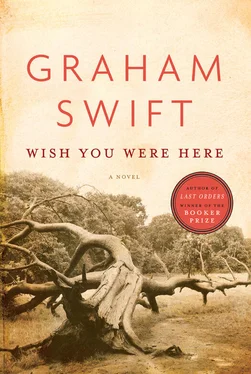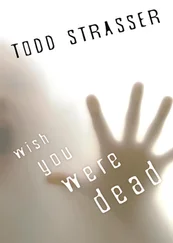And there was no question of stopping him. You allowed in a civilian under the sway of great distress what you would never allow in a soldier facing possible imminent death. What you would never have allowed in any of these lads lying here in their shiny black hearses.
When Jack reached the safety of the building, Major Richards felt a small flutter of relief, even of something like envy.
*
Derek Page and Dave Springer, the undertaker’s men from Babbages, also watched Jack turn and walk off across the grass, like a man, it seemed to them, who’d just remembered some other appointment. Then they looked at each other. Well, that was a bit sudden. But it was the privilege of the bereaved to act how they liked (Derek and Dave had seen some examples). They could laugh their heads off if they liked and be excused for it. And he’d done the decent thing, made contact, when that wasn’t in the rule book either, and they’d pocketed twenty each.
And he’d certainly made contact with that coffin.
The look they gave each other registered many things, but it included certain physical assessments. Had they been totally free to speak, one of them might have said to the other, ‘Big bugger, wasn’t he?’ They were, themselves, of similar, slightly below-average height. Not that this affected their current task, but so far as tomorrow went, it could only mean, if the other bearers included Andy Phillips and Jason Young, also from Babbages, that they’d be at the back with the thing sloping down in their direction. They’d be taking most of the weight. What they didn’t know yet was that the few yards they’d have to tread from the church porch to the grave were also on a downward slope, which would correct, even slightly reverse the imbalance. And it would be a short journey anyway, nothing like these soldier boys had just had to do — down the ramp of that plane and then across a hundred yards or more of tarmac.
A hard act to follow. They’d already had the thought.
But having now met Jack Luxton — the older brother — they both gave renewed consideration to what those six soldiers had carried and now lay in their own charge. In this case, of course, you couldn’t exactly be sure if Jack Luxton’s bulk was any sort of guide. You didn’t know quite what was in there. They hadn’t had to deal — a mercy maybe — with the body. It might be light as a child’s. They’d find out, perhaps, when they started the hearse. A sensitive foot on the accelerator, when you had to go slow, would tell you pretty quickly if any extra gas was needed to cope with the load.
But the thing weighed upon them anyway, quite apart from these gaugings of physical weight. It weighed upon them in a way that their work seldom did, since they were used to it by now. But they’d never done anything like this. ‘Big bugger’, had they spoken it, wouldn’t have excluded the sentiment ‘poor bugger’. In fact, the first phrase could almost have stood for the second, and ‘poor bugger’, had it been used of Jack, would have equally stood for the occupant of their hearse. Poor buggers both.
Derek and Dave were twenty-nine and thirty respectively. Neither had a brother. Dave had a younger sister. Derek was an only child. Each was married. Derek had two kids, Dave just the one. All the children were still so small — still learning to walk in one case — that it wasn’t yet an issue how they would be told what their daddies did for a living. They’d both drifted into the trade for the same simple reason: it was available work, which not everyone wanted, and they’d both thought of it as a stopgap. Now they’d both become stuck, at assistant level, in a business that they knew very often ran in families, and both wondered exactly what the future held. They’d worked together often now. They were mates. It was not beyond them to think, in this case: suppose it was your brother. Nor beyond them to think that they might have been out there, in Iraq. There was no call-up, of course, and they’d opted years ago for this other, though now it seemed not entirely unconnected, form of employment. Corporal Luxton had been not quite thirty-one.
Being undertaker’s men, they were not unfamiliar with ceremony, but they’d never been at anything like this before, and the chances that they might ever again were thin. You couldn’t deny it was a privilege and an honour, it was certainly something special — to pick up the body of a soldier who’d actually died, in action, for his country. But both Dave’s and Derek’s thoughts when they went in this direction tended to get a little lost. He’d been carried off that plane, anyway, here in Oxfordshire, wrapped in a bloody great Union Jack. Which had then been whisked smartly off the coffin by those same six soldiers who’d done the bearing, like some precious tablecloth that had to be put away in a drawer. Which had presumably been at the request of the bereaved — that man who’d just stomped off. So they might have been a little miffed. The two of them had just been denied the opportunity of driving a coffin, draped in a Union Jack, halfway across England. Which would certainly have turned heads. More than a hearse usually does.
And, when you thought about it, to anyone turning their head, it could only have meant one thing.
But now that they’d met Jack and seen him clutch the coffin like that and then each shaken his big hand, they weren’t so sure if they felt cheated or in fact glad at not having the flag. They weren’t sure either, from what they’d occasionally seen on the ten-o’clock news, if even words like ‘in action’ were quite the right words to be thinking of.
They had to be thinking of making their departure, anyway. A sudden chill breeze swirled through the crowd round the hearses, fluttering skirts, lifting ties from jackets, making hands go to hats. The weather was changing. They had to show respect, of course, to these other two lots. The original plan, so they’d understood, was for a slow initial procession, the three hearses one behind the other, through the main gate and through the town. They’d been looking forward to that. But how would that look now: two coffins with flags and one without? And, again, there was no book of rules. They had to take some initiative — a little like Jack.
But too quick an exit wouldn’t do either. It wasn’t so often you got to be in the presence of three deceaseds, and neither Derek nor Dave was sure of the strange, clinging mood around them. Their hearse, with its unadorned coffin — and now without its principal attending mourner — made them feel like poor relations at a wedding. On the other hand, they drew a vague sense of precedence from the fact that their coffin was a corporal’s, as against two privates’. They had the rank. And from the evident fact that even the army, in full parade splendour, seemed to have handed over command now to a few men in plain black. The decision was theirs and they felt strangely stirred by the possibility of unilateral action.
They looked at each other, then at their watches, like skippers judging the tide. It had already been agreed that Derek would do the first shift of driving. As, with appropriate, unhurried dignity, they got into their seats and started the engine, they were briefly the centre of a re-solemnised attention, everyone automatically standing upright and still. And no doubt of puzzlement too, but they couldn’t help that. They were in charge of Tom Luxton.
They moved off and crept back along their route of entry. It was not as anticipated. All the same, people going about other random business stopped and stood, a little nonplussed, as they passed, those in uniform saluting promptly enough, despite the absence of the flag. It was like being temporary, absconding royalty. They reached the main gate, then continued to creep — a touch more right foot perhaps — through the strange semi-military town, where again, on either side of them, there was some half-surprised but guessing observance, even scattered saluting. As if their one vehicle were a whole procession.
Читать дальше








![Питер Джеймс - Wish You Were Dead [story]](/books/430350/piter-dzhejms-wish-you-were-dead-story-thumb.webp)



